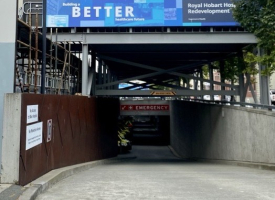Dr Bartone - Public Hospitals, Private Health Insurance, and Preventative Care
Transcript: AMA President, Dr Tony Bartone, Sky News, 8 January 2020
Subjects: Public Hospitals, Private Health Insurance, and Preventative Care
CHRIS SMITH: Well, we've heard this before, and a lot of us even have firsthand knowledge [audio skip], but according to the Australian Medical Association, the nation's public hospitals are stretched to the max, and are beginning to buckle under the strain. Now, this latest warning is being linked to Australia's ageing population who are living longer, but having more operations, and suffering from higher incidences of chronic disease. Emergency departments are apparently overflowing; elective surgery has blown out, and so too, of course, have waiting lists.
AMA President, Dr Tony Bartone, joins me from Melbourne. Good evening, Tony.
TONY BARTONE: Good evening, Chris.
CHRIS SMITH: I must admit, when I started to do a little bit of research on this topic today, I found that the word ‘breaking point’ was used by the AMA in 2017, February, and then in 2018 in March to refer to something that was going on in Melbourne at the time, and now you're doing it again. I don't want to be a cynic, but what's changed in that time? Is it getting that much worse?
TONY BARTONE: It is, Chris. And the AMA is trying to highlight, again. Each year we've produced a report card on our public hospitals. Each year we've seen that they've either stayed stagnant or gone backwards, both in terms of elective surgery waiting lists, and in terms of the numbers of people attending our emergency departments. And no matter which way you cut or slice or dice the numbers, numbers which are produced by the Australian Institute of Health and Welfare, what we know is that as a population we're rapidly growing.
As a population, we are ageing, we are living longer, and that's because we've got one of the best healthcare systems in the world. We are able to intervene and put into place appropriate measures, which allow Australians the access to quality of life-extending processes and procedures, and medications and interventions. And so, as a consequence, more and more [audio skip]. And underpinning all of that is, unfortunately, an increase in those lifestyles diseases, chronic and complex diseases, which put additional strain and burden on the system. And yes, we are getting worse and worse. If we look at the most recent measures, no State in Australia has improved emergency department waiting times or elective surgery waiting times. So, it's a real problem.
CHRIS SMITH: [Interrupts] One of the reasons for elective surgery waiting times would be - and correct me if I'm wrong here - people moving away from private health insurance, wouldn't it?
TONY BARTONE: That is one of the concerning features at this time. We know that private health insurance, in terms of take-up by the Australian population, has fallen consistently quarter on quarter for the last [audio skip] quarters. That is just over four years, and it shows no sign of abating. And, of course, people who do drop out of private health insurance are saying clearly that they are going to put their faith in a very, very world-class healthcare system, the public health system. But what they're saying is they're going to take their chances and wait their turn in an already overstretched system.
CHRIS SMITH: That's interesting. Despite the problems that you're considering here, you still maintain that we have the best healthcare system in the world, do you?
TONY BARTONE: Well, if you look at any of the outcomes, any of the measures on international comparisons, we are either one or two for any of those measures. If you look at the Commonwealth Fund, which ranks the performance of international comparable countries in the OECD, the only measure that we do not come out in one or two is our access and equity. And that is-
CHRIS SMITH: [Talks over] So maybe [Audio skip] result of being and having one of the greatest health systems in the world, that more people want to use it?
TONY BARTONE: Well, sometimes unfortunately, yes you might say success breeds problems. But that's a nice problem to have, I would have thought, and it really does underline the importance of having an appropriate plan to deal with the outcomes of your success. Now, what we're saying is that if we intervene earlier, if we put more of the healthcare dollars into prevention, if we put more into primary care, and trying to modify the disease burden into the years ahead, into the decades ahead, we're going to change that healthcare expenditure curve, we're going to change the demand, and allow the access and the equity to be one of the key hallmarks of our public system in the past, remain so.
CHRIS SMITH: [Talks over] Okay. Alright. Okay. If a solution needs to be found about driving people more into private health insurance [audio skip], the other problem I see is here we are throwing more money at health every single year, especially prior to elections. It becomes a health game of roulette, as more people throw money down on the table over health - which is great. So what do we have to do in terms of throwing more money at it? Is there a number that you have that you think will work better, or is it our administration that's not working as it should?
TONY BARTONE: And you've identified a number of the issues. Yes, we do need to be smarter about how we spend, we do need to plan, we do need to have more efficient use of the healthcare dollar, we need to stop wasting it in-between State and Federal divides. We need to understand though that really when we compare with other countries, we're sitting on about ten per cent of GDP in terms of health spending, and that puts us well down the lead table when it comes to expenditure in comparisons to the 12, the 13 per cents of many of the other OECD [audio skip] we talk about the US at 18, 19, 20 per cent and growing. So really what we're seeing is the outcome of many years of insufficient investment. We had a period where we really did clamp down on health spending, and now we're paying the price.
CHRIS SMITH: Okay. Should the responsibility for public health be in State hands only, or Federal hands only to try and streamline this, or is this blame game between the two just part of a system we have to put up with?
TONY BARTONE: Well, clearly, we've had this discussion many times before, and clearly we've ended up with this system where we have a co-funded system between State and Federal. What we need to ensure is that both parties are collaborative and coordinated, and efficient in their endeavours, in their planning, in their performance measures going forward, and so then we get the best use of each dollar.
CHRIS SMITH: Alright. I think we come [audio skip] twelve months and speak to you about the same kind of problem, but Tony Bartone, thank you very much for your time this evening.
____________________________________________________________________________
9 January 2020
CONTACT: John Flannery 02 6270 5477 / 0419 494 761


